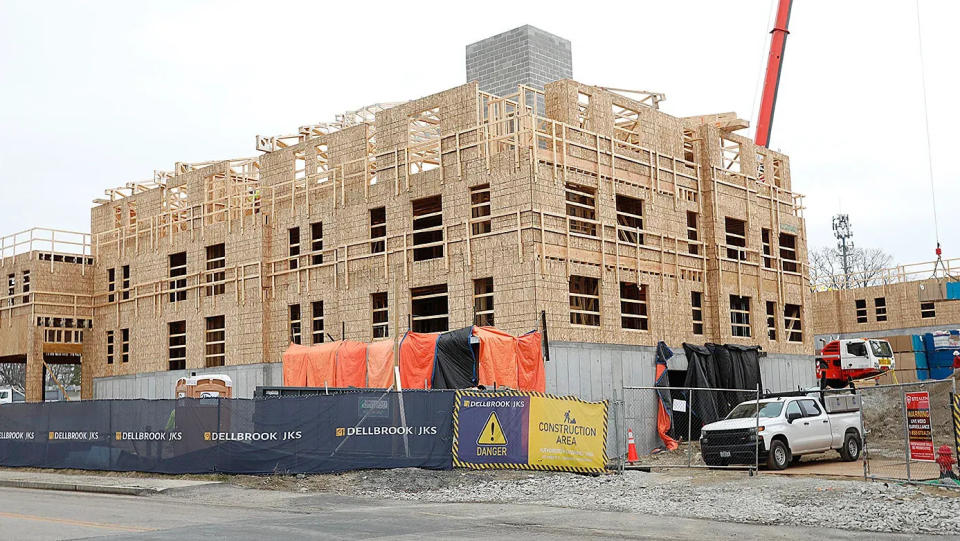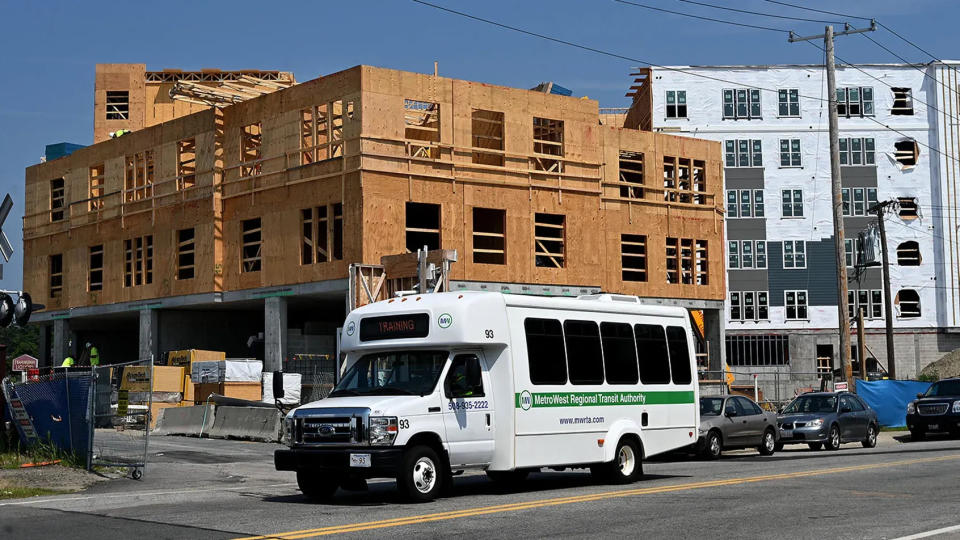Commercial real estate vital to law encouraging new housing near public transit
As more than 170 Massachusetts cities and towns begin drafting proposals to comply with the state’s new multifamily housing requirements, city planners and business leaders say commercial real estate could play a significant role in those rezoning plans.
The multifamily housing legislation that was passed under Gov. Charlie Baker, commonly known as the MBTA Communities Act, requires cities and towns served by the MBTA to incorporate at least one zoning district of “reasonable size” that allows by-right development of at least 15 housing units per acre.
But the new law also allows communities to permit mixed-use projects — such as commercial or ground floor retail spaces — by right in the new multifamily districts, meaning they do not need to undergo a discretionary review process for approval.

Greg Vasil, CEO of the Greater Boston Real Estate Board, said the law will have a major positive impact on commercial development in the commonwealth, in addition to providing more housing.
“There was no way that we could not embrace something like this that allowed for ground floor retail,” he said. “Because it really builds communities. It's great for businesses, it's great for people and it gives a lot of ability for people in those communities to even start businesses.”
'Clear and concise' regulations for developers to follow
In contrast with current zoning standards in many communities, where developers frequently must apply for zoning variances or special permits — processes that often stall or even kill construction — Vasil said one of the new law’s primary advantages for developers is that it provides regulations that are “clear and concise so that they know exactly what they can do under the rules.”
“This law is an attempt to get sort of out of that whole Massachusetts (system) where everything gets funneled to a regulatory body where it can get gunked up and slowed down,” Vasil said. “And instead (transitioning) to one where: this is what the rule is, and everybody's treated the same based on this rule.”
More construction:MBTA zoning rules could increase MetroWest housing stock by up to 22%
Patrick McMahon, president of NAIOP Massachusetts, the Commercial Real Estate Development Association, agrees that the new MBTA requirements are “really smart, from a planning perspective.”
“It's putting housing where housing wants to be, where residents want to be, and connecting them with the infrastructure to get them to those clusters of commercial development,” he said.

Besides serving as a NAIOP board member, McMahon is also a senior vice president of regional development at Federal Realty Investment Trust, which owns and developed Assembly Row in Somerville.
Under the new law, Somerville’s rezoning will need to allow for a minimum multifamily unit capacity of 9,067 units.
According to the action plan it submitted to the state, Somerville is considering a group site near the Assembly Square T stop as a potential site for an MBTA overlay district. The city's plan identified the site as “somewhere that should be completely transformed into a new neighborhood.”
Affordability push:Framingham City Council OKs new, higher standard for affordable housing
McMahon said Federal Realty is “an active participant in those discussions, with both the city and the community.”
“We're very cognizant that the conversations that we have with the city are in a public forum so as to dissuade the notion that we are working behind the scenes with the city,” he said. “I think that's a really smart model for any municipality to follow, in order to avoid even the perception that a private development community is driving policy.”
Municipalities cannot require mixed-use projects
Almost all of the 175 communities affected by the housing law have submitted an action plan to the state explaining how they might implement the new zoning requirements. But in many cities and towns, actually doing so could prove to be a significant hurdle.
Although the new law allows for mixed use in multifamily districts, communities cannot require it as a prerequisite for new housing, a stipulation that has raised concern for many local officials.
In their action plan submitted to the Department of Housing and Community Development, Brookline town planners wrote that without “the ability to require commercial use on the ground floor in our core commercial districts ... we may not be able to secure a majority vote at Town Meeting.”
'Zoning is a local issue':Local officials push back on state proposed MBTA Communities housing mandate
In Newton, where the city is in the midst of a comprehensive rezoning proposal that would allow for denser housing development in 12 of its village centers, planners are facing a similar challenge. Mixed-use development is already allowed by right in most village centers, and in some, developers need a special permit from the city to even build without ground floor commercial space.
“There's a great desire in our village centers to have mixed-use developments,” said Barney Heath, Newton’s director of planning and development. “The heart of a lot of the village centers is the ground-floor commercial (space) ... and the MBTA Communities Act doesn't provide for our ability to require that.”
Jennifer Caira, a deputy director of planning for the city, said the planning team is considering a number of workarounds to incentivize commercial development, such as allowing even larger buildings than what is required by the new law for projects that include mixed use. The team is also proposing requiring mixed use outright in some new zoning areas and sacrificing being able to count those units toward the MBTA unit capacity.
“We're trying to balance what is best for village centers along with the need for housing and the state requirements,” she said.
Still, Heath and Caira said that rezoning — and the new residents it would bring to the city’s main commercial districts — has the potential to significantly boost business development in Newton.
“The customer base ... is important for businesses to be able to remain healthy,” Heath said. “We think that this is a pretty solid formula — that if you increase the customer base, it will help ensure that commercial businesses thrive: your restaurants, your stores, your service-sector shops, etc.”
Katherine Einstein, a professor of political science at Boston University, said allowing for commercial development in new housing developments could actually make implementing rezoning proposals more politically feasible for communities affected by the law.
“It definitely helps people to be more excited about development when — in addition to housing, which they might be lukewarm about — there's an exciting possibility for restaurants coming in or some other kinds of shops that they might be enthusiastic about,” she said.
This article originally appeared on MetroWest Daily News: Commercial development a major piece for Mass. housing law
